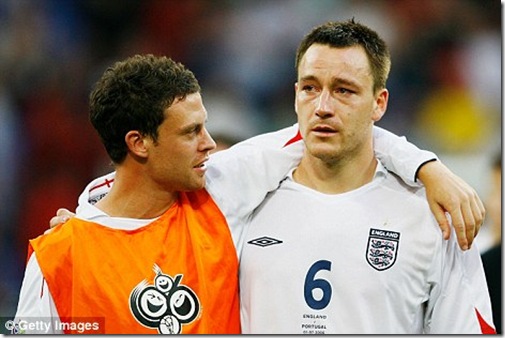The JT “superinjunction” has redressed the balance between privacy law and freedom of expression.
If it weren’t for Twitter and a media conscious judge, John Terry’s latest indiscretions with Vanessa Peronccel and his betrayal of Wayne Bridge may have remained buried under paper work and bound by red tape.
Instead these revelations have been splashed across the front and back pages, calling into question the future role of the England football captain, the moral code of team mates and the responsibilities befitting a millionaire role model. Despite this melodrama, what will leave a lasting legacy is in fact how the social media phenomenon of Twitter enabled this to happen and returned freedom of expression to the press.
 While Terry tried to keep his affair quiet and his lawyers applied successfully for an injunction to gag the press from reporting details, the judge in question, Lord Justice Tugendhat would have considered the merits of privacy and interests of the public.
While Terry tried to keep his affair quiet and his lawyers applied successfully for an injunction to gag the press from reporting details, the judge in question, Lord Justice Tugendhat would have considered the merits of privacy and interests of the public.
The European convention on human rights, article 8 – respect for private and family life – and article 10, which defends freedom of expression understandably made this matter a family affair. With past cases, such as between the News of the World and Formula 1 boss Max Mosley over images of his Nazi orgy; or between the Guardian and Carter Ruck over the Trafigura affair, the press have been found in breach of privacy. As Marurice Chittenden of the Sunday Times wrote: “Until now, 8 was giving 10 a thrashing.”
Subsequently a superinjunction was ordered against reporting details, the press were left flummoxed in having to keep this quiet and Terry could smugly go about his business. That is, until Twitter entered the fray and blew the debate wide open.
Google and Twitter ignored the superinjunction:

 Tweets were not bound by this super-injunction as authors had no way of knowing this order was in place. Gossip and rumours were unchecked on the social networking site as shown by a simple Google search for “John Terry” that produced these tweets from while the superinjunction was in force at 11.15 on Friday before it was lifted at 2pm.
Tweets were not bound by this super-injunction as authors had no way of knowing this order was in place. Gossip and rumours were unchecked on the social networking site as shown by a simple Google search for “John Terry” that produced these tweets from while the superinjunction was in force at 11.15 on Friday before it was lifted at 2pm.
The judge overseeing the case understood this information was widely accessible to the public rendering an injunction to merely protect Terry’s sponsorship dealings as inadequate justification to gag the press. The Sunday Times championed “Tugendhat of the Inner Templar” as the protector of freedoms of expression.
On Friday Tugendhat reviewed the case and, realising that anyone with a computer could find even more sordid allegations about the affair just a mouse click away, lifted the injunction. He added: “Freedom to live as one chooses is one of the most valuable freedoms. But so is the freedom to criticise – within the limits of the law – the conduct of other members of society as being socially harmful, or wrong.”
If the super part of the injunction can be lifted, revealing the fact that someone has sought an injunction, it exposes the person to gossip on the internet and elsewhere.
The former Lord Chief Justice Lord Woolf was also reported in the Sunday Times as recognising the significance of press freedoms. He said: “Any interference with freedom of speech has to be looked at with great care and suspicion. Terry was trying to stop people from talking about something that was already in the public domain.”
Since then there have been increasing reports on Twitter that Terry was involved in encouraging his mistress Perroncel to have an abortion:
 ‘Vishaldutta’ said: “John Terry has been s***ing Wayne Bridge’s girlfriend. Got her pregnant and she had abortion.”
‘Vishaldutta’ said: “John Terry has been s***ing Wayne Bridge’s girlfriend. Got her pregnant and she had abortion.”
‘asMaestro’ wrote: “Dad of the Year John Terry…forced her to have an abortion. Wow. This is the England captain?”
Until now I have been slightly sceptical of the role Twitter has to play for journalism. On one hand it provides an endless resource for breaking news and an insight into the privileged lives of the celebrities who use (or misuse) it. It also allows papers and news outlets greater opportunity to reach their readers.
But, like how these 3D glasses have suddenly become fashionable again, many feel those incessant tweets all day long were merely up-starts indulging in the latest gimmick of our tech-addicted generation. And now “citizen journalists” are getting all the scoops, making on-the-patch reporting less rewarding and all the more redundant.
The limited restraints on citizen journalism enabled through Twitter will mean information is rarely kept secret for long. The growing popularity of social networking can afford columnists and editorials more license to debate issues of public interest. Thus making it harder for those in the public eye to keep their skeletons locked away in their cupboards.
At a time when media and national empires have come to blows over restrictions of censorship abroad, Tugendhat has overruled the strict regulations incurred in this country by the Max Mosley ruling, setting a precedent weighted in favour of freedom of expression and the press.
Mark Stephens, the media lawyer, said: “As a result of a failed attempt to gag the world the lawyers have made a drama out of a crisis. It is an object lesson.” Fundamentally, it was Terry’s misdemeanour. Citizen journalists exposed the crime. Tugendhat called the felon to account. And Twitter served as the vehicle for justice.
I used to think Twitter was for twits. That was until I saw its full journalistic capacity to light up the shady parts of this world and realised its role in exposing the biggest twit of all in JT.
Please please do not use “like” in your postings. It is a dreadful expletive worse than the dreadful saying “you know what I mean” It is unnecessary and should be stamped out not encouraged in written form where one should really know better.
Excuse me? Is that all you can offer. Would hardly call it constructive criticism. What did you think about the article itself?
It is not all I can offer but I was at the end of a very long day and thought I would have a quick look over your article on a recommendation and thought you may want some suggestions for future postings, it was just an irritant in an article I otherwise thought was rather good. I just thought as a writer yourself you may value advice and suggestions, I apologise.
There has been some interesting reports of late upon libel and I am looking forward to seeing how laws will adjust as at the moment very few have addressed issues of the difficulty of confidentiality with regards to users of services like Twitter and bloggers. Journalists are bound by the PCC code and are usually educated on laws regarding contempt of court and privacy issues. Most tweeters are not, but it is important all internet users abide by a code. Hope this helps, as I said it was meant to be a suggestion I would not have made it if I realised it would cause offence.
I don’t use twitter strider but your article is convincing me I should sign up and see what all the fuss is about! Although, I do think it has been a nuisance which has done more damage than good for sports stars, like Darren Bent for example. But I wasn’t aware this topic was being discussed on twitter before PA got wind of it. I first read of it at about 2.15 on Friday when in work and the story started circulating on the wire. I think the most amusing part after reading PA’s breaking account, apart from John Terry’s imminent humiliation, was the fact that Terry was once made ‘Dad of the Year’ by Daddies sauce hahaha. Excuse my language, but what a cunt.
By the way, dunno if you seen my Facebook status on Friday saying how I’d just clocked ‘McNae’s Law for Journalists’ in work, but folk had it out to make sure they knew what they were legally allowed to publish after this revelation first came about! Thankfully, I wasn’t handed the task – Law is not my bag.
In answer to the outpour of response (couple of opinions from close friends) I have felt the need to elaborate:
These restrictions imposed by a superinjunction (forcing papers to hold back reports about Terry’s sordid affairs and the rest) were not applicable to those gossiping on Twitter – as of yet they have no legal obligations – and a Google search of JT’s name brought up a number of references to his extra-marital affairs in tweets before the papers were allowed to report anything.
Therefore Tugendhat became aware that unbound rumours were spreading like wildfire on social media and gossip sites so there was no need to suppress the journalists eager to comment on the debacle.
Twitter can be a problem for spreading misinformation but what is important is that it can open up the subject for debate – that can be responsibly (in theory) analysed and discussed – by columnists who were previously bound to silence by injunctions and superinjunctions and fear of being sued for all their papers were worth (see the Max Mosley case).
[…] what a difference a superinjunction makes. The revelations (not like everyone was really that surprised) about Terry’s affairs and […]
[…] Twitter and the twit: How the John Terry affair has granted the press their freedom February 2010 7 comments 3 […]